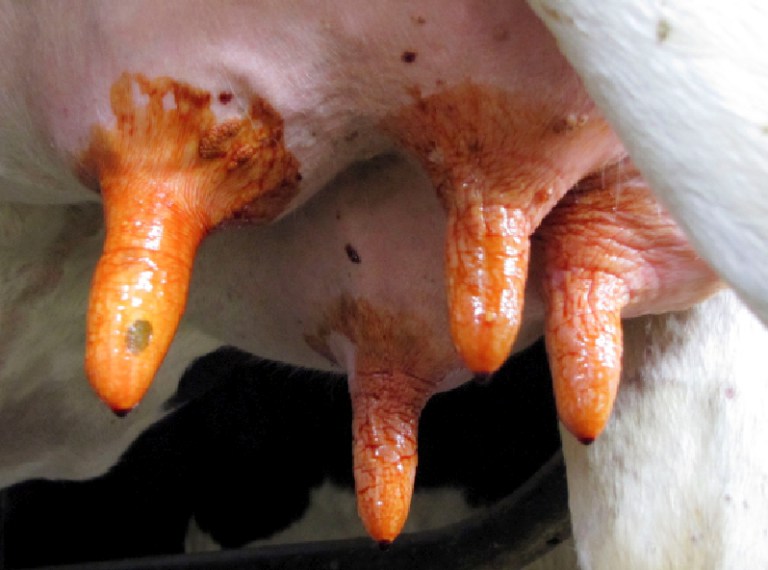(Português) Mastite e a Exploração de Vacas
ORIGINAL LANGUAGES, 1 Jan 2018
David Arioch | Jornalismo Cultural – TRANSCEND Media Service
27 dez 2017 – Você percebe mais uma vez como estamos imersos em uma cultura especista, que encara os animais não humanos como nada mais do que produtos, quando cientistas ligados à saúde animal apontam como principal prejuízo da mastite, uma grave inflamação das glândulas mamárias, a queda na produção de leite da vaca.
Será que a saúde da vaca deveria ficar em segundo plano? Não em uma perspectiva mais justa. Li um artigo sobre produção de leite e contagem de células somáticas em vacas leiteiras intitulado “Milk Production and Somatic Cell Counts: A Cow-Level Analysis”, de J.K. Hand, A. Godkin e D.F. Kelton, publicado no Journal of Dairy Science.
Nesse trabalho, os pesquisadores citam como piores consequências da mastite a baixa na produção, o que consequentemente leva ao “descarte” (esta foi a palavra usada) das vacas. Sim, as vacas que não atingem sua meta na produção de leite são mortas.
Também são citados os “grandes” e indesejados gastos com tratamento de infecções severas. Curiosamente, muitas das infecções que atingem as vacas estão associadas ao ritmo de exploração industrial. Ou seja, o ser humano gera o problema e ainda age como se o prejuízo fosse provocado pela vaca.
___________________________________
 David Arioch é jornalista, pesquisador e documentarista. Trabalha profissionalmente há dez anos com jornalismo cultural e literário.
David Arioch é jornalista, pesquisador e documentarista. Trabalha profissionalmente há dez anos com jornalismo cultural e literário.
Go to Original – davidarioch.com
DISCLAIMER: The statements, views and opinions expressed in pieces republished here are solely those of the authors and do not necessarily represent those of TMS. In accordance with title 17 U.S.C. section 107, this material is distributed without profit to those who have expressed a prior interest in receiving the included information for research and educational purposes. TMS has no affiliation whatsoever with the originator of this article nor is TMS endorsed or sponsored by the originator. “GO TO ORIGINAL” links are provided as a convenience to our readers and allow for verification of authenticity. However, as originating pages are often updated by their originating host sites, the versions posted may not match the versions our readers view when clicking the “GO TO ORIGINAL” links. This site contains copyrighted material the use of which has not always been specifically authorized by the copyright owner. We are making such material available in our efforts to advance understanding of environmental, political, human rights, economic, democracy, scientific, and social justice issues, etc. We believe this constitutes a ‘fair use’ of any such copyrighted material as provided for in section 107 of the US Copyright Law. In accordance with Title 17 U.S.C. Section 107, the material on this site is distributed without profit to those who have expressed a prior interest in receiving the included information for research and educational purposes. For more information go to: http://www.law.cornell.edu/uscode/17/107.shtml. If you wish to use copyrighted material from this site for purposes of your own that go beyond ‘fair use’, you must obtain permission from the copyright owner.
Read more
Click here to go to the current weekly digest or pick another article:
ORIGINAL LANGUAGES:
